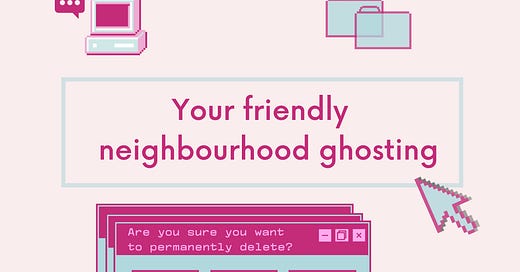Hello and I hope you’re having a lovely day to anyone reading.
(PSA: I know my schedule has been a hot mess of late)
People love reading about things that have happened to them. There’s something beautiful in finding your own pain in someone else’s experiences and the way it can connect you so profoundly with someone you don’t know. I know that I have felt so legitimatised, so much freer from embarrassment, whenever I’ve read a personal essay or about a character in a story who’s somehow understood a dark or shameful period of my own life.
Ghosting, like most painful and private experiences, can’t really be understood by those who haven’t gone through it. The name suggests an apparition, but ghosting is really more about an absence than any kind of return. I decided to make this the topic of today’s letter after some recent self re-evaluation about the power I’ve let romantic partners, particularly men, have over my life and my sense of self-worth.
I likewise hope that by admitting to having let my self-value be defined by a man, other women/ people reading this can understand this not as an isolated personal failure, but a natural by-product of a culture which idolises male validation, especially that which comes from romantic attachments.
As with all forms of grief, the healing process is intensely personal and without a specific set of proceedings. It isn’t a clean wound which heals on a set time scale. It’s continuously reopened, and prone to infecting your life again without notice if you don’t tend to it regularly. The pain of my own experience is dull, but I can still feel its effects despite three years having passed. The possibility of this pain re-occurring is something I recognise the impact of every time I entertain the possibility of a new romantic or sexual relationship.
Ghosting is more akin to grieving than a normal break-up as it denies the victim of any emotional closure, forcing the person to move on from a relationship they may have spent months investing themselves in at a moment’s notice. If what happened to me was, indeed, some sort of emotional death, then I had been helping this person poison me for months. When the increasingly limited amounts of intimacy I received were finally gone, I was left dependent on the person who’d entirely cut me off from their emotional support. I had developed a need for this other person who had been slowly withdrawing from me, and overnight I was forced to finally recognise a truth I’d been fighting for months: he didn’t care now, and probably never had.
While not everyone’s experience of ghosting will be alike, and might not involve the level of emotional manipulation I experienced, I think commonalities do exist. One is a sense of shame which comes with the realisation about the depth of your investment in someone who fundamentally doesn’t care. In addition to this, there is the pain of realising that, without your efforts to sustain intimacy, you may have stopped talking long before now. The notion of a haunting, of something incorporeal which persists out of an unseen necessity, then becomes pretty apt for describing your situation. To put it more plainly, ghosting ensures that the absence of another person is suddenly unavoidable.
Without opportunity for emotional closure or productive communication, healing from a trauma like this becomes that much more painful and internal. I know women, myself included, who have poured themselves completely into partners who were entirely ambivalent to them. I’m sure this is the same for some of the men that I know, too. I’d like this letter to be a reminder that you control your own happiness, and to always ask yourself if the situation you’re in is truly good for you, not just good for the person you’re seeing.
Thanks so much to anyone who took the time to read this. Love to you all.
***
Read Come As You Are by Emily Nagoski now! This book has been so valuable for me in understanding my own worth & feeling normal in my sexuality.




